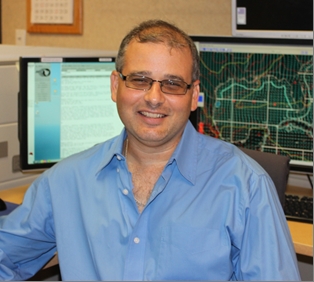Q & A with NHC - Jorge Aguirre-Echevarria
 Jorge Aguirre-Echevarria
Jorge Aguirre-Echevarria
Meteorologist
Tropical Analysis & Forecast Branch (TAFB)
National Hurricane Center
By Dennis Feltgen
Public Affairs Officer
NOAA Communications & External Affairs
National Hurricane Center
Everyone gets this question. Did you have the defective weather gene as a kid?
I would say I did, yes. Soon after I moved to Florida in the '70s, I really started noticing the local weather, especially those afternoon showers and storms. And then, in 1979, there were two occurrences that really got my attention. One was in April — a heavy rain and flood event. The Miami schools were closed for three days. And then later that summer – Hurricane David.
That made the choice of a college major easier.
I started at Miami-Dade Community College and I was thinking about meteorology all of the time. In between all of the basic classes I was taking, I had to go outside and take a look at the sky to see what was going on. Once that weather bug gets you, there is no escape.
But you can't get a meteorology degree at MDCC.
No, so I got a scholarship to the University of Miami. It didn't have an undergraduate meteorology program yet, so I became a physics major. I'd have to take physics anyway, so I did that and got minors in both math and geography. Then I transferred to Florida State.
Another Seminole!
FSU was always advertised as the meteorology school, and it was the only one in Florida with the undergraduate program. And one of the professors, Dr. Dave Stuart, placed a phone number on the blackboard in my senior year of the personnel department for those who had a desire to work for the National Weather Service. That was a big help.
The modernization was underway then.
It was a good time to get in. When I graduated in April of '89, I got home and soon received a letter from the Weather Service stating it was opening up some slots. I'd requested to stay in Florida, and ended up in Key West that September as an Intern.
You were there when they were trying to close down that office.
It was not going to be part of the modernization program, and everyone was really bitter about it. Fortunately, the Emergency Management community in the Keys was able to stop it, and the office is one of the 122 Weather Forecast Offices nationwide.
What did you do?
I launched the weather balloons for the upper data and tracked the instrument package as it relayed the data back to the office. I also did the weather radio. It was not automated back then, which means I had to manually cut the tracks on the audio carts. One little mistake and you had to start all over again.
How did you get out of Key West?
It took a while to bid out of the office because, in 1992 and '93, there was a bottleneck of applications due to the new offices. It took five years to transfer, but I did and ended up right here at the National Hurricane Center in the Tropical Analysis and Forecast Branch (TAFB).
You're not the most traveled person that I have come across here.
No, just the two places. I am on my 18th year here! I started as an analyst in the old office on Dixie Highway, working on the surface map and tropical weather discussion. Then in '98 I was promoted to aviation and marine forecaster.
Several years ago, you participated in the Caribbean Hurricane Awareness Tour (CHAT).
I jumped at that chance; what an enlightenment! To travel aboard a USAF Reserve Hurricane Hunter aircraft, to see that perspective on the recon side of things, to meet the customers of our products, it's one of the highlights of my career.
As I recall, there was a big crowd in Puerto Rico.
The last stop, Roosevelt Roads, was overwhelming. There was a record 17,000 people that came through the aircraft that day. I'd never seen anything like it.
You are also bilingual. Does that help you with your job at all?
It doesn't have any effect in terms of the products that I write and issue. In a personal endeavor, it does help me communicate with those customers in Spanish. It's a significant number, and I'm proud I am able to provide critical weather information to them.
And it's not just customers.
Not at all! I have been asked by the NHC Hurricane Specialists on occasion to speak (in Spanish) with representatives of the Cuban Meteorological Services to discuss watches and warnings for that nation. It is a privilege to be able to do this.
Where do want to go from here?
That's a good question. I really have no strong desire to go anywhere else, at least right now. South Florida is home for me, having grown up in the area, so a move would be hard.
Where do you see yourself in 10 years?
I would hope to still be in Florida. I've thought about management, now that I have all of this operational experience here. That might be something to think about and pursue.
Can you turn it off when you walk out of the building?
It is hard to do, because when I leave, I am still thinking about what I did. Plus, I am still looking at the sky. I can't turn it off completely. Maybe if I traveled to a country far away.
What about relaxation?
I do reading, walking, playing with the dog, even something simple as running errands or taking care of things around the home. I also work out when I can, and go the beach when the marine/weather conditions are suitable. They all help to get my mind off of it.
Send comments to: NHC.Public.Affairs@noaa.gov
Return to Q & A index of stories


